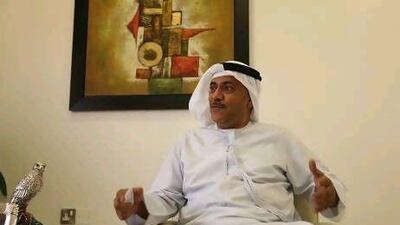ABU DHABI // When Fathi Buhazza's airline received a government contract to fly humanitarian aid from the UAE to earthquake-ravaged Pakistan five years ago, he regretted taking money for charitable work.
"We were paid a lot of money for our services," he said. "I did not feel that this is part of our value to benefit from the misery of other people, so we decided to waive our costs for any humanitarian flights."
A study revealing that 30 per cent of cargo space on all scheduled passenger flights around the world were empty inspired Mr Buhazza to develop his plan.
"This is equivalent to four million tonnes of empty space every week in more than 3,400 airports across 220 countries," said Mr Buhazza, the chief executive of Maximus Air Cargo and chairman of the Care By Air charity.
"If we fill less than 0.3 per cent of these empty spaces with rice, we will have enough to feed approximately 5 million people," he said.
"Eighty per cent of humanitarian spending is on logistics. If you donate US$100 to a child in Somalia, he will receive 20 and 80 will go to the costs of getting the money there. The idea is to do an at-cost and efficient logistical transport system that is both beneficial to the company and the benefactors."
For example, the Ministry of Health's 30-tonne needle donation to Nepal this year was transported via Care By Air through Etihad's scheduled flights, Mr Buhazza explained.
"The cargo consisted of 4 million single-use syringes, to prevent the spread of communicable diseases," he said.
Nepal was chosen because of its urgent need for injection needle safety, and Nepal's Ministry of Health warmly welcomed the delivery.
"Etihad had regular scheduled flights and we fit 26 tonnes of needles in eight Etihad flights, which normally would have cost us $200,000 but only cost $8,500," he said.
Since Care by Air began in 2009, it has helped deliver more than 1,000 tonnes of aid from the UAE to various parts of the world.
The charity works in conjunction with Abu Dhabi Airports Company, Etihad Airways and Aramex.
"Abu Dhabi Airports Company has waived their airport fees for the humanitarian flights, Adnoc has reduced some of the fuel costs which reach up to 60 per cent of the total cost, Aramex has provided us with their logistical help and transport free of charge," Mr Buhazza said.
Care By Air was registered this year as a charitable organisation at the direction Sheikh Hamdan bin Zayed, Ruler's Representative in the Western Region and president of the UAE Red Crescent Authority. "His Highness was very fond of this idea and has a great understanding of its potential," Mr Buhazza said. "He guided us to establish it as a charity organisation".
He said Care by Air can reduce the cost of delivering aid by up to 35 per cent.
The programme is now being presented to other aviation authorities in the country.
"We hope to start across the UAE then take it to the GCC and then around the globe," Mr Buhazza said.
Maximus Air, which administers the Care By Air programme, was contracted by the Abu Dhabi Government in 2009 to transport all humanitarian aid sent by the UAE - more than 80 flights so far.
"This year alone we have conducted 16 flights to Nepal, Yemen and Chad," said Lama Awaad, corporate social responsibility manager for Care By Air.
The most recent flight was on Monday of last week to deliver rice to Yemen.
"When you land in a new location carrying aid and the people come to meet you, they are not there to just get the goods and go but to greet you for being there," said Capt Marcos San Salvador, chief pilot at Maximus Air.
"Our pilots are excited to conduct these flights because it takes them to new locations and it is greatly fulfilling for the pilots and crew," he said.
With a staff of 220, the airline operates eight aircrafts including Antonovs and Ilyushins, which can carry heavy loads and can land on tarmac or gravel.

